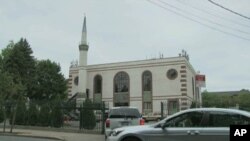There is strong opposition to construction of an Islamic center two blocks from the area in New York City known as Ground Zero, the site of the September 11, 2001 terrorist attacks. Critics say it would dishonor the memory of victims and pain families of those killed that day by Islamic extremists. There are, however, numerous mosques throughout the city, serving hundreds of thousands of local Muslims.
A member of the Albanian Islamic Cultural Center on Staten Island recites verses from the Koran, which he has memorized in its entirety. It is a small late afternoon prayer session at a congregation of 2,000 Albanian Muslim families that fills the mosque on Fridays. Imam Tahir Kukaj explains why the mosque was built.
"The number of Albanians and Muslims is increasing; were increasing at that time and are still increasing. And Albanians actually did have a mosque, which was on Van Dusen Street. It was a small house. It was not fulfilling the needs of the community, " the Imam said.
Kukaj says congregation members cooperate with local churches and synagogues on such humanitarian activities as blood and food drives, summer youth camps and visits to the elderly.
More than 100 mosques in New York include the stately Islamic Center on Manhattan's Upper East Side. Smaller congregations, including the Egyptian mosque on Staten Island, use converted homes. Imam Ali Abdushakur Muhammed notes mosque construction, like that of any building, must be coordinated with local government.
The Imam says that God willing, in the future, if the congregation goes through proper channels and garners the right resources, its members can build more mosques according to American law.
The mosque in the Harlem neighborhood provides the community with a school and various social services. It also leases space to small businesses. Locals say it seems like it has been there forever. But it was actually converted from a casino in 1965.
Jerrilynn Dodds, dean at Sarah Lawrence College in New York and the author of a book about the mosques of New York, says America's Islamic community expanded in the late 1960s with the lifting of immigration quotas on non-European countries. She notes the city's existing mosques include one just a few blocks from the proposed Islamic Center near Ground Zero. It has not stirred the passions as the one still in the planning stage.
"A building's ability to elicit emotion actually grows from the importance a culture gives to a building. And in New York, we give great importance to buildings. We fetishize them; we make them symbols in a way they are not always in other places," Dodds said.
Thus, passions over an Islamic Center yet to be built have collided with emotions for two iconic towers lost on September 11, 2001. Dodds, however, notes the most important element in any building is not the structure, but the people who occupy it.




